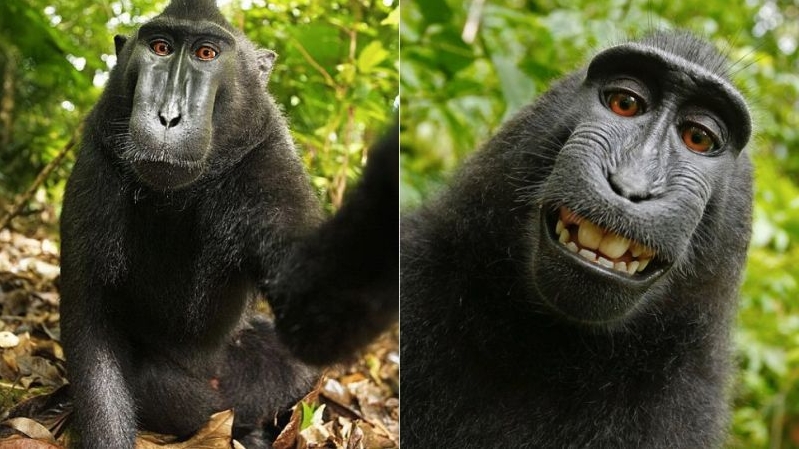
(Reuters) - A rare crested macaque monkey who snapped a well-known, grinning "selfie" should be declared the photo's owner and receive damages for copyright infringement after it was used in a wildlife book, animal rights activists argued in a federal lawsuit filed on Tuesday.
Naruto, a six-year-old macaque who lives free in the Tangkoko Reserve on the Indonesian island of Sulawesi, took the image and several others about four years ago using a camera left unattended by British photographer David Slater, People for the Ethical Treatment of Animals (PETA) said in the suit.
The so-called Monkey Selfies that resulted came from "a series of purposeful and voluntary actions by Naruto, unaided by Slater," said the complaint, filed in U.S. District Court in San Francisco.
"Naruto has the right to own and benefit from the copyright ... in the same manner and to the same extent as any other author," the suit said. (Link to 'selfie' published by PETA: http://bit.ly/1V8Hnnl)
Slater told Reuters he felt "rather bemused" and persecuted by the lawsuit, which he said seemed to be a publicity stunt.
He said he was very disappointed not to have been contacted by PETA in advance, and described himself as a low-paid wildlife photographer who has been struggling to earn a living.
"I am sympathetic in my book for animals having rights to property in some circumstances, but in no way do I mean copyrights," Slater said in an e-mail.
"Their focus seems more aimed at making me out to be a criminal than someone who loves and respects and fights for animals. ... I have to wonder what are the true motives behind this attack on me," he wrote.
The lawsuit names Slater, his UK-based company Wildlife Personalities, and Blurb, Inc., a Delaware-based corporation which beginning last year published and sold for profit in the United States a book containing copies of the photos. Naruto's orange-eyed, beaming selfie is its front cover.
PETA said it was bringing the legal action on the monkey's behalf because he could not, "due to inaccessibility and incapacity," and that the court had jurisdiction because of the book sales made in the United States.
The Copyright Act of 1976 was "sufficiently broad ... to extend to any original work, including those created by Naruto," the group's complaint read.
Sulawesi crested macaques are critically endangered, according to the International Union for the Conservation of Nature's Red List of Threatened Species.
Between 4,000 to 6,000 live on the island, and PETA said their numbers have decreased by about 90 percent in the last 25 years, mostly due to human encroachment on their rainforest homes.
PETA asked the court to declare Naruto the author and copyright owner of the photos, and to award the monkey damages.
It also sought a court order letting PETA and a noted primatologist, Dr. Antje Engelhardt of Georg-August University, Gottingen, Germany, administer Naruto's rights on condition that all proceeds be used solely for the benefit of him, his family and community, "including the preservation of their habitat."
A spokesman for Blurb, which describes itself as a self-publishing and marketing platform, said the company did not comment on pending litigation.
(Reporting by Daniel Wallis in Denver; Editing by Sandra Maler)




